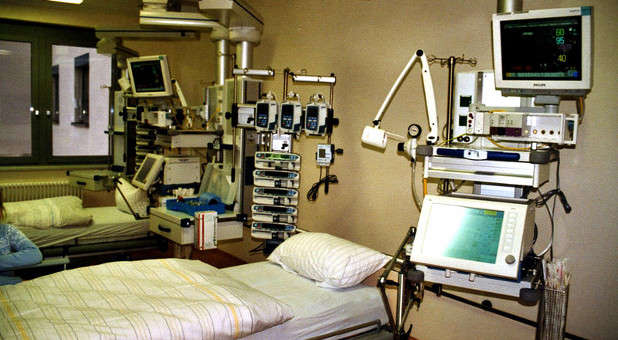Heart disease is the number-one killer of American men and women today—and this is odd, considering that heart disease was an uncommon cause of death at the beginning of the 20th century.
While it’s true that more people died of infectious diseases in those days and often didn’t live long enough to die of heart disease, they also consumed much greater amounts of long-chain omega-3 fatty acids. As subsequent generations began eating less fish and more beef, the rates of heart disease for those generations shot up.
Hippocrates said, “Whatever is good for the heart is probably good for the mind.” Let’s reverse his insight a little and say, “Whatever is good for the mind is probably good for the heart.” As you now know, my dietary program provides excellent benefits for your brain. You can also assume that it’s going to provide extraordinary benefits for your heart. In fact, that’s the reason I started my research 20 years ago.
I wanted to see if I could change the expression of my own genes, which were programmed for an early death from heart disease—something that occurred in my father, his brothers, and my grandfather. This led me to the concept of the Zone and to my continuing research to evolve and refine that concept.
One of the best ways to live a longer and better life is to reduce your likelihood of developing heart disease. If we could eliminate heart disease tomorrow, the average life expectancy of every American would increase by an estimated 10 years. Advances in medical care have cut the death rate from heart disease, but they haven’t touched the incidence rates. We are getting heart disease more than ever, and as our population ages, more of us will die from this condition.
We are simply not doing a good enough job of addressing the underlying cause of heart disease—a decrease in blood flow to the heart and an increase in inflammation in the arteries. These both result from an increased production of “bad” eicosanoids. Rather than putting your faith in the hope that some major surgery or new drug treatment will save your life after you get heart disease, why not just avoid getting it in the first place?
Protecting yourself against heart disease requires far more than just simply lowering your cholesterol levels. In fact, 50 percent of the people who are hospitalized with heart attacks have normal cholesterol levels, and 25 percent of people who develop premature heart disease have no traditional risk factors at all. Maybe elevated cholesterol isn’t the real cause of heart disease in the first place.
The best predictors of a future heart attack come from prospective studies that follow healthy people for a number of years to determine which ones go on to develop heart disease, and then to figure out why. Because these are expensive trials, very few of them are done. But those that exist have indicated that cholesterol levels are, in fact, a very poor predictor of future heart attacks. In fact, the likelihood of future heart attacks has everything to do with excess levels of “bad” eicosanoids—exactly the hormones that can be modified by my dietary recommendations.
A heart attack is simply the death of muscle cells in the heart from a lack of oxygen. This occurs when blood flow can’t reach the heart because of a blockage or clot in the arteries caused by a clumping of blood platelets, or because of inflammation that causes an unstable plaque to break off and block the blood flow in the artery. Sometimes a spasm in the artery blocks the flow to the heart, or the heart goes into electrical chaos and simply stops its synchronized beating on its own.
Causes of Heart Attacks
1. Clot formation
2. Plaque instability
3. Vasospasm
4. Electrical chaos (sudden death)
None of these four causes of heart attacks has much to do with increased cholesterol levels, but all of them have everything to do with “bad” eicosanoids.
When I first wrote The Zone, I was strongly criticized for asserting that elevated insulin levels were a major factor in heart disease. (This is despite the fact that diabetics are known to be at highly increased risk of heart disease.) People still wanted to believe that the vast majority of heart problems were caused mainly by dietary fat and high cholesterol levels.
Now the tide of medical opinion is beginning to turn. During the past several years, more and more research, especially from prospective studies, has shown that elevated insulin puts you at a greatly increased risk of heart disease. The reason why elevated insulin levels increase your risk of heart disease is that excess insulin causes your body to overproduce “bad” eicosanoids. This is why you need to combine insulin control with high-dose fish oil if your goal is treating heart disease. Only this one-two dietary punch can maximally reduce the AA/EPA ratio and thus restrict the formation of “bad” eicosanoids.
The Importance of Your TG/HDL Ratio
When I first started doing cardiovascular research in the early 1970s, two prevailing theories of heart disease fought for supremacy. One theory held that high cholesterol levels predominantly caused heart disease, and therefore that simply lowering total cholesterol could cure heart disease. The other theory was more complicated and had to do with looking at heart disease as a complex inflammatory process.
Scientists used to think we had to worry only about our total cholesterol level, but then researchers found this wasn’t a very strong predictor of heart disease. Next came the realization that there was both “good” and “bad” cholesterol. The “good” cholesterol was found in high-density lipoprotein (HDL) particles, and the “bad” cholesterol in low-density lipoprotein (LDL) particles. This launched a war against “bad” cholesterol, which is predominantly elevated by saturated fat.
In more recent years, scientists discovered two types of LDL cholesterol. One type consists of large, fluffy LDL particles that appear to have no potential to cause atherosclerosis or the development of plaques on the large or medium-sized arteries. The other type consists of small, dense LDL particles that are strongly associated with arterial plaques and this can increase the risk of heart disease. So now you have good “bad” cholesterol (large, fluffy LD particles) and bad “bad” cholesterol (small, dense LDL). Getting confused? Well, so is everyone else who is fighting the cholesterol wars, because we now know that the more bad “bad” cholesterol you have, the more likely you are to have a heart attack, whereas having a high level of the good “bad” cholesterol isn’t likely to have any adverse health effects.
How can you tell which type of LDL you have? All you have to do is determine your ratio of triglycerides to HDL cholesterol, which would be found as part of the results of your last cholesterol screening. If you ratio is less than 2, you have predominantly large, fluffy LDL particles that are not going to do you much harm. If your ratio is greater than 4, you have a lot of small, dense LDL particles that can accelerate the development of atherosclerotic plaques—regardless of your total cholesterol levels.
The importance of this TG/HDL ratio was confirmed by studies from the Harvard Medical School. This research found that the higher your TG/HDL ratio, the more likely you would be to have a heart attack. How much more likely? In one study, those with the highest ratio had sixteen times the risk of those with the lowest ratio. That’s a huge increase in risk of for the most common cause of death.
In contrast to our national wars on smoking and high cholesterol, you hear nothing of our battle plan for reducing elevated TG/HDL levels. Since a high TG/HDL ratio is a surrogate marker for elevated insulin, you can see why I was making my plea to launch a national war on elevated insulin many years ago.
Heart Disease Rx: Reduce Inflammation
If reducing inflammation is so powerful in reducing our death rate from heart attacks, the solution should be simple: add more fish oil to the diet. This idea was first posed in the 1970s by researchers who found through epidemiological studies that Eskimos in Greenland had virtually no heart disease even though they consumed a high-fat diet. Over the years, additional studies suggested that the more fish you consume, the lower your risk of dying from heart disease.
One of these studies was the DART study, which found that eating one serving of fish per week decreased heart attacks by 29 percent in patients who had had a previous heart attack. The researchers couldn’t definitely prove, however, that it was the fish oil in the fish that conferred these protective benefits, or whether there was confounding factor, such as that people who eat fish have healthier lifestyles in general.
More definitive proof of the benefits of fish oil was found in the results of the GISSI trial, in which patients with heart disease who took about 1 gram per day of ultra refined-grade long-chain omega-3 fatty acids had a 45 percent reduction in their risk of having a sudden fatal heart attack, a 30 percent reduction in their total risk of cardiovascular mortality, and a 20 percent reduction in overall mortality. Surprisingly, vitamin E (given by itself or in combination with fish oil) had no benefits.
The most powerful statement on the role of diet in preventing heart disease, however, comes from the Lyon Diet Heart Study. In this study, survivors of heart attacks were split into two groups. One group was put on a diet that followed the American Heart Association recommendations (basically the USDA Food Pyramid), and the second group was put on a Mediterranean-type diet (rich in fruits, vegetables, and fish; supplemented with short-chain omega-3 fatty acids; and very low in omega-6). At the end of four years, the two groups had the same cholesterol levels. There was, however, a more than 70 percent reduction in both fatal and nonfatal heart attacks in the group on the Mediterranean diet compared with the control group, who were allowed to eat hefty amounts of omega-6 fatty acids. This study was very damaging for the cholesterol theory of heart disease.
More important, during the four years the group on the Mediterranean diet experienced no sudden deaths (a term used to describe electrical chaos in the heart, which makes it stop beating in rhythm and is the primary cause of cardiovascular mortality), the primary difference between the two groups was the ratio of the arachidonic acid to eicosapentaenoic acid in the blood. The AA/EPA ratio of the individuals in the active group was 6.1, compared with 9.0 in the group following the American Heart Association diet. Thus, a 30 percent reduction in the AA/EPA ratio resulted in a greater than 70 percent reduction in fatal and nonfatal heart attacks, despite the fact that the TG/HDL ratio didn’t change for either group. This is why I believe that the AA/EPA ratio is by far the most powerful predictor of future heart disease.
As dramatic as the results of the Lyon Diet Heart Study were, I believe they could have been even better if the patients had followed my dietary recommendations. The group on the Mediterranean diet never reached an AA/EPA ratio of 1.5, which is similar to that found in the Japanese, who have the lowest rates of heart disease in the world. This is the ideal that I define in my dietary program. Also, the TG/HDL ratio was still elevated in both groups in the study, and this indicates that insulin levels hadn’t been lowered and that both groups were still eating diets too rich in carbohydrates.
My dietary program represents a considerable improvement over the intervention diets used in both the GISSI study and the Lyon Diet Heart. Where the GISSI study provided a little less than 1 gram of pharmaceutical-grade fish oil, I recommend five times as much. (You need at least 3 to 4 grams of ultra refined long-chain omega-3 fatty acids per day to lower triglycerides and thus lower the TG/HDL ratio.) While the Lyon Diet Heart Study recommended eating more fruits, I recommend 10 to 15 servings of fruits and vegetables per day.
For the original article, visit cbn.com. Excerpted from The Omega RX Zone: The Miracle of the New High-Dose Fish Oil by Dr. Barry Sears. For more information about Dr. Barry Sears, his incredible fish oil supplements, or the popular Zone Diet, please visit www.zoneliving.com.
See an error in this article?
To contact us or to submit an article






















